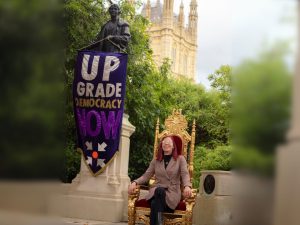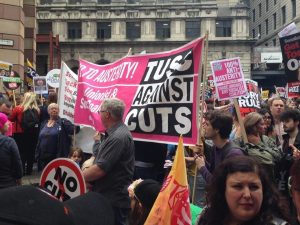The House of the People is an initiative from Assemble, which is a group with roots in the modern climate crisis movement. Its founders aren’t about sitting around and waiting for change. They’re about building change right now.
Before the 2024 general election, Assemble helped to set up local assemblies around the country, which anyone could attend to deliberate on important local, national, and international issues, and on the potential solutions to them.
Assemble also backed a number of independent candidates in the election, including many whom the Canary interviewed. On 11 August, Assemble launched the House of the People in London. The aim was to bring together representatives from local assemblies in different parts of the country.
The Canary covered the launch, and you can see a film including video clips and images from the event on our YouTube page.
The structure of the House of the People
There were numerous tables around the room at the launch, with a diverse group of people. After some introductions, the participants had to deliberate over the question “What do you not trust politics to deliver for our country?” Each table took notes, which organisers would later stick up around the room.
Every table had a facilitator, someone who would help to guide the process but would not participate themselves. They began by explaining how things would work. And their most important responsibility, I’d say, was to keep track of time and do their best to ensure that participants with more assertive personalities didn’t dominate.
Keeping that balance between personalities proved to be a tough job at times, but also to be an essential one to ensure equality and respect for everyone’s time. Another aspect was ensuring that participants stayed on task, with facilitators needing to bring clarity of purpose and refocusing discussions when they went of topic. Some facilitators seemed to have more experience or competency than others, which sometimes had an impact on how well deliberations flowed. But overall, they seemed to go very well.
In the first deliberation, the Canary sat at one table to observe the process silently. The question participants had to answer was ‘What do you not trust the current political system to deliver?’
Deliberation number one
One person said the system simply doesn’t listen to its citizens. They added that honesty, openness, and accessibility were words they couldn’t associate with the current institutions. Politicians mislead people, they said, and in reality a “backdoor system” is dominant. Unfortunately, they thought, many voters are happy to hand over responsibility to political leaders and then just forget about politics.
Another person said that, during the 2024 election, it was clear that long-term involvement in the political system wasn’t at the top of many voters’ agendas. They simply wanted to ‘get the Tories out’. And it’s the misuse of the party whip, this participant argued, that’s at the centre of the putrefaction of the two-party electoral system.
Another participant insisted that the current system was incapable of making even a small percentage of the massive change needed to avert the ongoing climate emergency. They wouldn’t trust politicians to provide a plan for the creation of a sustainable society, or anything in the interests of the majority of citizens.
The person next to them, meanwhile, answered that politicians were unlikely to do “anything good”, and were simply the entertainment division of big corporations.
One person, who stressed that they were sick of party politics, lamented that they didn’t have much faith in their local community’s desire for active involvement in politics, especially because many focused on voting bad people out rather than voting someone in for a positive reason.
Nonetheless, they were curious to see if assemblies could start to make a difference on that front. They believed that politicians will do their best to avoid fostering a system where ordinary people are more informed and have more involvement. It’s difficult to know, they admitted, whether the lack of participation and engagement from many voters is a result or a cause of the anti-democratic, self-serving system that exists today.
The facilitator then asked participants to try and summarise everyone’s comments and identify common themes. And one key theme was definitely the lack of trust people had in an out-of-touch system to do anything worthwhile for the majority.
After this deliberation, a room facilitator selected a person from several different tables to give some feedback on the key themes of each table’s conversations.
Deliberation number two
The second issue for deliberation was what people thought should be the key issues the House of the People should focus on going forwards. There were already some issues that local assemblies had mentioned previously that were open for discussion.
However, there didn’t appear to be significant talk of issues outside the ones outlined. It was quite clear that the priorities for most people around the room were opposing the Gaza genocide and other conflicts, addressing the climate emergency, and dealing with economic inequality.
The third point would surely be high on the list of many people throughout the country, but for those who are not campaigners there would likely be other issues that didn’t have representation in the House of the People.
The Canary sat down at another table during this discussion.
One person thought that holding politicians to account, especially in case of corrupt behaviour, was essential.
Another participant believed that economic inequality related directly to many of the other issues. Decentralising power, increasing localism and empowering communities, they argued, would be key to achieve many of the other aims which local assemblies had outlined previously. They stressed that people today have focused so much on money and possessions that they’ve lost track of other things that matter for human existence, like the value of society, education, health, and the environment.
The person next to them agreed, insisting that it would be tough to get other things without upgrading democracy first. They also highlighted an important point that was perhaps not a focus at the assembly. This type of event could very much serve to create a safe space for interaction between people who usually wouldn’t interact. If it could become a place where people who’ve lived in an area their whole lives could meet and listen to people who have more recently moved into the area, it could reduce the level of ‘othering’ that often grows when people have no opportunity to interact with people who are culturally or ethnically different from them or have had different life experiences from them.
Another participant asserted that the House of the People should separate its “wish list” of ideas it cared about ideologically from its “process” priorities. So if the aim of the house was to expand participatory democracy, it would need to focus on that as the first step. They also argued that supporting media reform, and generally helping to inform people better, would be essential. Assemblies, they insisted, should also tap into and support mass movements to maximise their numbers. Nonetheless, they agreed that “economic inequality is key to it all”.
The final person insisted that assemblies shouldn’t just be encouraging greater political participation, but also greater economic participation. They should be supporting the cause of economic democracy, where resources are in the hands of ordinary people rather than those of a tiny, wealthy elite. Focusing on that would help to deal with other priorities. Another point they highlighted was that solutions are sometimes local. While some communities might favour one solution to a problem, another community may favour another. And that’s ok.
Demographics and atmosphere
Overall, it was clear that a big chunk of the participants were already activists or had already taken part in some form of campaigning in the past. Southern English accents were also overrepresented. And while there were some working-class voices in the venue, they were underrepresented in national terms. The same could be said of northern voices or accents from Scotland, Wales, or Northern Ireland, which seemed to be few and far between.
With the event taking place in London, which is quite tough and expensive to get to for many people from further away than the Midlands, that was perhaps no surprise. Nevertheless, it is a key area of concern if the House of the People is to be a truly representative and inclusive body. And to be fair, organisers did indeed tell The Canary that there are serious considerations about holding events in different locations around the country in the future, so this is an issue they’re already aware of. Hopefully, they’ll pay close attention to this going forwards.
The Canary didn’t do a survey of attendees, but there appeared to be a decent gender balance, with neither men nor women clearly dominating in terms of numbers. Regarding representation of minority communities, meanwhile, there seemed to be a fairly representative cross-section of Black and brown people attending, along with disabled people and people from the LGBTQ+ community. Local assemblies would surely have attendance more representative of the people living in specific areas, but as a national assembly the make-up was probably fairly accurate in terms of diversity.
The atmosphere was generally very positive. Smiles were widespread, as was engagement. There may have been some moments of discomfort when people had different views, personalities, or ways of expressing themselves, but everyone appeared to handle these differences in respectful, engaging ways. There was clearly a level of enjoyment, with some regular laughs. But overall, the issues people were discussing were serious, so there was a clear focus on the mission of deliberation.
Overall reflections
One big challenge for the idea of assemblies is clearly getting people involved from a wide range of backgrounds. It’s almost a no brainer for existing campaigners to participate, and likewise for people who are already politically engaged in general. Also, people with more disposable income and free time on their hands are more likely to be open to attending. But what about other people?
How do you convince people who’ve been working hard all week on low pay to attend assemblies. Or how do you involve people who aren’t able to leave the house? How do you convince people to attend if they think democratic participation means just marking a box every few years? What can you do to make it relevant for ordinary people who don’t go on marches, take direct action, or participate in campaign groups? How do you shift people’s mindset and actually make them feel excitement about the prospect of actually being active in forging the future of their community?
It’s really important for the process to keep in mind the everyday issues of different communities too. While there’s a lot that regions around the country have in common, it’s also true that different parts of the country have different problems or perspectives. And there will almost certainly be people in some places who will say ‘the issues the assemblies are focusing on don’t seem to be the issues I think are important’.
Assemble definitely appear to be engaging with these questions, and trying to answer them. They’re actively encouraging all people to participate. And they’re seeking to ensure that everyone’s voices have equal weight. But it’s a question of making sure there’s diverse messaging too, so they can reach out to people in different areas in the best ways possible.
Another challenge, as I mentioned above, is making sure discussions run cleanly. Some people definitely have strong views, and assertive personalities that hammer those views home. Others have unclear views, unclear ways of expressing them, or just go off topic. Nonetheless, it felt like a really safe space. And in part, that was thanks to Assemble’s facilitators, who focused on centering respect. There are also areas of opportunity for them to improve their facilitating skills, though, in order to navigate in the most effective way possible the social challenges that present themselves.
A final point, which one participant rightly mentioned, was that it shouldn’t only be passionate campaigners who speak at the front during these events. It should also be ordinary people. Without that voice, they said, the assemblies could struggle to have the impact they hope to.
A window of hope
This is one of the most hopeful political events I’ve ever been to. It seems like a window into a possible sense of community that many places I’ve lived in seem to have lost over the years. The organisers planned it well. They ran it well. And it was a fascinating, important experience which funnelled a lot of positive energy into the same room at the same time. I would definitely recommend that other people get involved in order to shape the idea of assemblies into the most democratic, inclusive experience possible. And I for one look forward to seeing how this develops going forwards.
For more on the event, see the Canary’s film:
Featured image via the Canary




